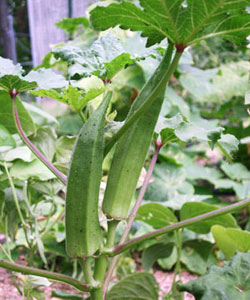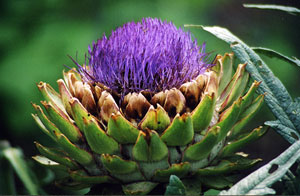

Hundreds of cultivars of peppers (Capsicum annuum) are currently grown in warm regions of the world. The more pungent peppers have stimulant properties which can be attributed to the bitter resin capsaicin. The sweet cultivars, like this ‘Gypsy’ hybrid, are used to add flavor to cooked dishes as well as salads, relishes, and chutneys.

The tomato (Lycopersicon esculentum) is a member of the nightshade family and is composed of more than 93 percent water. Lycopene is the pigment responsible for the red color of tomatoes and has demonstrated antioxidant activity associated with a lowered risk of cancer.
ABC plants only organically-grown heritage tomatoes. “Schimmeig Striped Hollow” is the variety shown here. It is not as high in lycopene as the redder varieties, but it is great for stuffing as it really is hollow.

Okra (Hibiscus esculenta) is a member of the mallow family, Malvaceae, and may be the only member of the family to be used as a vegetable. Okra is a popular ingredient in Creole and Cajun food. Okra pods contain a gummy substance that thickens any dish to which they are added. Prolonged cooking only promotes this gumminess, so minimal cooking is best.

Florence fennel (Foeniculum vulgare var. azoricum), also called finocchio, is grown primarily for its bulbous base. The bulb is used as a vegetable is salads and other dishes. Both Florence fennel and regular fennel are good for indigestion and gas.

Artichoke (Cynara scolymus) is probably an improved cultivar of the wild cardoon (Cynara cardunculus). The leaves of artichoke contain glycosides, flavonoids, and tannins that promote the secretion of bile from the liver when eaten. The presence of inulin, a starch which is not used for energy metabolism but promotes healthy intestinal activity, makes eating artichokes, whether it’s the hearts or the leaves, a good idea. Additionally artichoke leaves can lower the cholesterol level in the blood.

The benefits of eating cabbage (Brassica oleracea var. capitata) include improving digestion, alkalizing the blood, stimulating the immune system, killing harmful bacteria and viruses, soothing ulcers, and reducing the risk of cancer.

Eggplant (Solanum melongena) is a rich source of bioflavonoids and very low in calories since eggplant is composed mainly of water. Eggplant is infamous for soaking up large amounts of oil. One method to prevent this is to salt the skins and let them sit for ten minutes; this will collapse the cells and may also remove any unpleasant bitter taste.

|